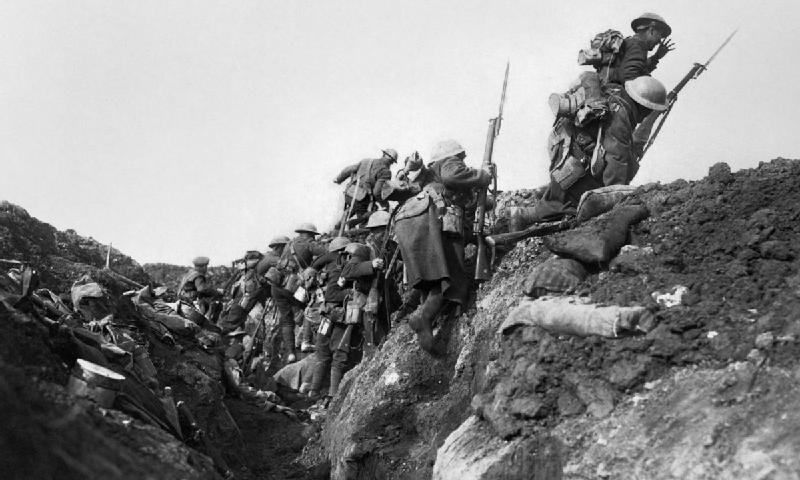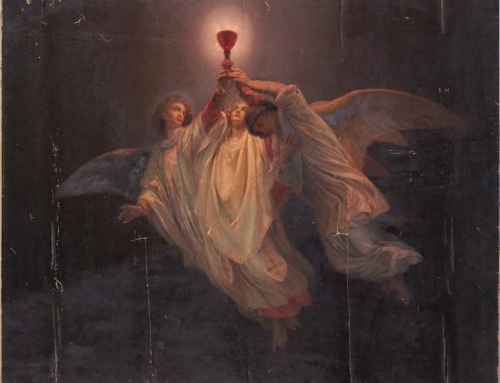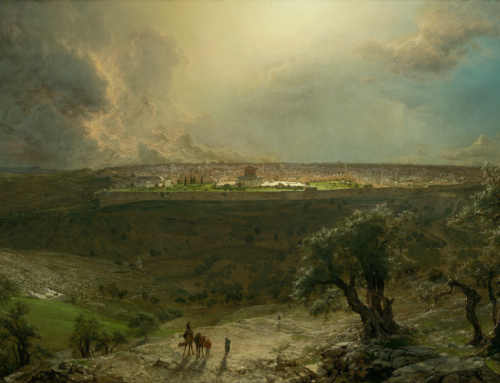Can we glorify death?
The Roman poet, Horace, did. Celebrating stouthearted soldiers in his Odes (III.2), he wrote, “Dulce et decorum est pro patria mori—Sweet and fitting it is to die for the fatherland.” His poem captured the hearts of many Romans and even the hearts of our own countrymen. Arlington National Cemetery incorporates Horace’s verse over the rear entrance to the Memorial Amphitheater.
The Greek lyric poet, Pindar, provides a more cautious view of war, having recognized that not all is glory. He wrote: “War is sweet to those who have no experience of it, but the experienced man trembles exceedingly at heart on its approach” (Fragment 110). Pindar’s verse is responsible for the more common latin proverb, dulce bellum inexpertis—sweet is war to the untried.
The tension between the glory of virtue and the horror of battle never was tighter strung than during the Great War, World War I. Gone were the romantic notions of thundering steps, glittering steel, and hearts stirred to battle by drums. The advancement of the machine age had swallowed soldiers in clouds of gas, fire, and shrapnel.
Wilfred Owen, one tried in war, did not glory in it. Between the horror of his first months on the front line (early 1917) and his eventual death in battle (late 1918), Owen composed poetry while recovering from shell shock. His head rang from migraines and his thoughts raced with nightmares of the war. His most famous poem, Dulce et Decorum Est, describes the horror of a gas attack he experienced on 12 January 1917. The poem, also known as The Old Lie, bombards the untried, blasting away the jingoistic fantasies of Horace:
If in some smothering dreams you too could pace
Behind the wagon that we flung him in,
And watch the white eyes writhing in his face,
His hanging face, like a devil’s sick of sin;
If you could hear, at every jolt, the blood
Come gargling from the froth-corrupted lungs,
Obscene as cancer, bitter as the cud
Of vile, incurable sores on innocent tongues, —
My friend, you would not tell with such high zest
To children ardent for some desperate glory,
The old Lie: Dulce et decorum est Pro patria mori.
Owen described his fallen comrade with agonizing detail and deepened our pain with his Qoheleth-like dismissal of death’s purpose. In reading this poem, we are disabused of the notion that there is glory in death. While Owen’s anti-war rhetoric poses questions of just war theory, it also can cause us to reflect on the Christian view of death.
We often overlook that Christian initiation requires death. In the rite of baptism, the minister prays, “May all who are buried with Christ in the death of baptism rise also with him to newness of life.”
Immersion in water does not jar us like battlefield explosions, but this act symbolizes death in Christ, a hidden reality which will become manifest later. Contained in baptism is the seed of grace that will eventually lead to real death, an unavoidable end. We rejoice in the Resurrection in Christ, but we also acknowledge that the baptized will come to the Cross. Baptism may lead to a death at old age in a warm bed surrounded by loved ones, or it may not.
Within the Church’s tradition, the martyrs witness to the Christian’s perseverance in the face of death. Saint Ignatius of Antioch longed to be ground in the teeth of the lion. Given the option to escape death, St. Polycarp brandished unflappable confidence in God’s help. While being seared alive, St. Lawrence taunted his grillmasters. The Church even honors the bravery of virgin martyrs from Cecilia to Maria Goretti. We Dominicans depict our martyrs with axes in heads and bodies pierced with swords.
Saint Paul reminds us of this sober reality: “Are you unaware that we who were baptized into Christ Jesus were baptized into his death? We were indeed buried with him through baptism into death, so that, just as Christ was raised from the dead by the glory of the Father, we too might live in newness of life” (Rom 6:3–4).
Though our baptism may lead to a death, perhaps a gruesome one, we do not wrestle with its meaning or glory. We follow after the Son who was obedient to the Father unto death on a cross. While Owen questioned dying for an earthly homeland, the baptized face death for a heavenly homeland. In the wake of the Great War’s carnage, Owen may have been right about Horace, but we can despoil him like the Hebrews despoiled the Egyptians:
Dulce et decorum est pro Patre mori—Sweet and fitting it is to die for the Father.
✠
Photo by Ivor Castle







